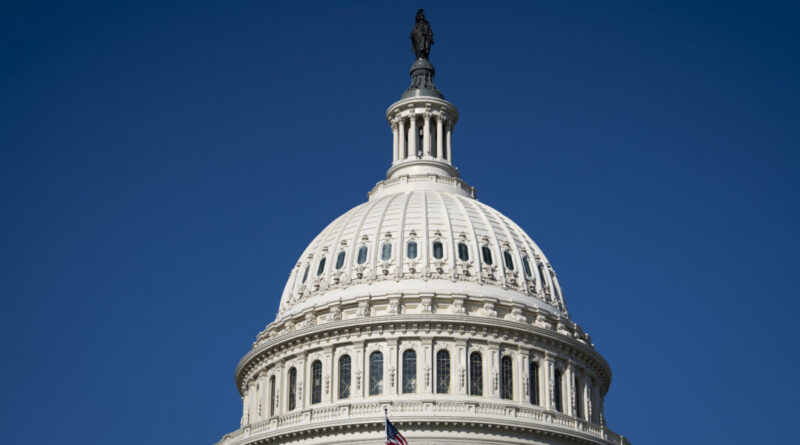GOP Gains Additional House Seats, Edges Closer to Majority
If current projections hold, Republicans are on track to retain their majority.
Republicans appear on track to retain control of the U.S. House of Representatives, which would enable them to lock down a GOP trifecta in Washington for the first time since 2016.
As of 10:25 a.m. on Nov. 8, The Associated Press projected that Republicans had picked up at least 211 seats while Democrats had at least 199. A party needs 218 to claim the majority.
Current Decision Desk HQ projections give Republicans a total of 222 seats and Democrats a total of 213. If the results hold, Republicans would enter the new Congress with the same number of seats as they controlled at the start of the current Congress. However, the final results could differ, as many seats are separated by as few as hundreds of votes. It may not be known for days.
Most of the races that remain uncalled are on the West Coast, with the majority clustered in California.
Should Republicans take the House, as they seem on track to do, they would come back to Washington in January with a trifecta—control of the House, Senate, and White House.
House Speaker Mike Johnson (R-La.) projected confidence that his party would retain the majority in a Nov. 6 letter to his colleagues.
“As we have planned and expected, the latest data indicates that we will also hold and likely grow our Republican majority in the House, even though we faced a map with 18 Biden-won seats,” Johnson said.
Democrats, including House Minority Leader Hakeem Jeffries (D-N.Y.), nevertheless state that they still have a pathway to 218.
“We must count every vote,” Jeffries said, saying the battle for control of the House “has yet to be decided.”
Republicans had a sweeping victory in the presidential contest, with President-elect Donald Trump winning at least 295 electoral votes, carrying five of the seven swing states as of publication time. He’s expected to win the remaining two—Arizona and Nevada—which have yet to be called.
Republicans won control of the Senate, flipping at least four seats and bringing their total in the upper chamber to 53 seats as of publication time. Two Senate races, in Arizona and Nevada, remain too close to call.
Incumbents Hang On
In spite of big shifts at the presidential and Senate levels, most incumbents held on, with few flips for either party.
On the Republican side, Reps. Jen Kiggans of Virginia, Scott Perry of Pennsylvania, John James of Michigan, Thomas Kean Jr. of New Jersey, Zachary Nunn of Iowa, and Mike Lawler of New York have already been declared the winners in their races.
GOP Reps. Mariannette Miller-Meeks of Iowa and Don Bacon of Nebraska also appear set to hold onto their seats with more than 95 percent of the vote counted, though AP hasn’t made a final call on those races.
On the Democrat side, incumbent Reps. Emilia Sykes of Ohio, Gabe Vasquez of New Mexico, and Pat Ryan of New York are projected to hold off Republican challengers.
Democrats also appear favored in several races that AP hasn’t called yet.
With 99 percent of the vote counted in her district, Rep. Marcy Kaptur (D-Ohio) seems set to hang on, as do Reps. Marie Gluesenkamp Perez (D-Wash.) and Jared Golden (D-Maine).
Those final two represent a tough blow for Republicans in Trump-voting districts they hoped they could flip.
Rep. Don Davis (D-N.C.), and newcomer Eugene Vindman—running for the Virginia seat vacated by Rep. Abigail Spanberger (D-Va.), who’s running for governor of Virginia—have already been declared victorious in their election bids.
Few Seats Flip
Both parties did flip some seats.
Most Republican gains came from the Rust Belt states, while Democrats managed to unseat at least three New York Republicans—Reps. Marc Molinaro, Brandon Williams, and Anthony D’Esposito.
In Michigan, Republicans picked up a seat in the state’s Seventh Congressional District, which was open after being vacated by Democrat Rep. Elissa Slotkin, who pursued and won the U.S. Senate seat vacated by retiring Sen. Debbie Stabenow (D-Mich.).
In Pennsylvania, Republicans unseated two Democratic incumbents: Reps. Susan Wild and Matthew Cartwright.
Alaska’s single at-large district is still in play. It’s currently held by Rep. Mary Peltola (D-Alaska), whose 2022 victory for the seat was attributed by many to the state’s ranked-choice voting system.
It’s unclear whether Republican challenger Nick Begich will be able to exceed the 50 percent threshold needed in the state to avoid a second round under the state’s voting system, which would likely benefit Peltola.
Republicans are also poised to flip the California seat vacated by Democratic Rep. Katie Porter, who resigned to pursue an ultimately unsuccessful bid for the U.S. Senate in the state.
The Associated Press contributed to this report.




